Born on this date in 1971 in Liberec, Czechoslovakia,
Petr Nedvěd came to Calgary, Alberta for an international midget tournament at the age of 17. After scoring 17 goals and 9 assists in 9 games to star in the tournament, Nedvěd made the bold, life-changing decision to defect without even informing his parents of his plan. With just $20 and the help of another Czech, whom he refuses to identify all these years later, he walked into a police station and out from under the rule of the Communist Party.
To begin his path to the NHL, Nedvěd joined the Seattle Thunderbirds of the WHL and caught the attention of NHL scouts by scoring 65 goals and 145 points in 71 games to place sixth in the WHL scoring race. The following spring he was drafted with the second overall pick in the 1990 NHL Entry Draft by the Vancouver Canucks.
He jumped straight to the NHL the following season, seeing action in 61 games and scoring 16 points. His point total more than doubled during the 1991-92 season to 37 points and quite nearly doubled that in 1992-93 when he arrived offensively with a 38 goal 71 point season. After the Canucks were eliminated by the Los Angeles Kings in the playoffs, Nedvěd asked King's superstar Wayne Gretzky for a game stick, which drew the ire of Canucks fans, especially after three seasons of playoff struggles by Nedvěd, who had scored just 3 goals in 28 postseason games.
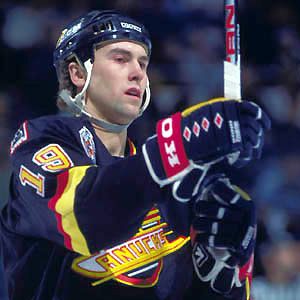 A young Nedvěd began his NHL career in Vancouver
A young Nedvěd began his NHL career in Vancouver
The relationship with Vancouver was fractured beyond repair at the beginning of the 1993-94 season when Nedvěd held out in a bitter contract dispute. During his holdout, he became a Canadian citizen which allowed him to join the Canadian National Team and compete in the 1994 Olympics for Canada where he earned a silver medal after scoring 5 goals in 8 games.
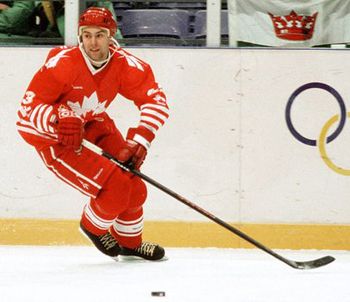 One of his contract disputes saw him playing with
the Canadian National Team
One of his contract disputes saw him playing with
the Canadian National Team
He eventually signed with the St. Louis Blues near the trading deadline, with another player being awarded to the Canucks as compensation.
After playing less than 20 games for the Blues to finish the season, Nedvěd was traded to the New York Rangers for the 1994-95 season, which was limited to 48 games due to a labor dispute. Nedvěd was then involved in a headline making trade, as he and Sergei Zubov were sent to the Pittsburgh Penguins for Luc Robitaille and Ulf Samuelsson.
Now a member of the offensive juggernaut led by Mario Lemieux, Jaromir Jagr and Ron Francis, Nedvěd enjoyed the best offensive season of his career with 45 goals and 99 points. He would score a further 10 goals and 20 points in 18 playoff games, which included a goal in the fourth overtime in a game against the Washington Capitals when he patiently walked around a prone Capitals defenseman and shot the puck through traffic for the game winner. The 79:15 minutes of overtime made it the longest game in the NHL in 60 years.
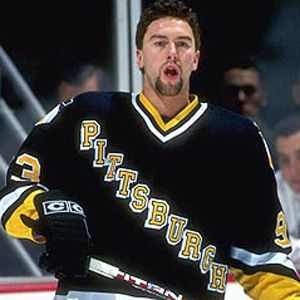 Nedvěd as a member of the high powered Penguins
Nedvěd as a member of the high powered Penguins
Before the next NHL season began, Nedvěd played for the Czech Republic in the 1996 World Cup of Hockey, as the now Canadian citizen was not restricted by the rules of the IIHF, as the tournament was under the rules of the NHL.
His second season with the Penguins had Nedvěd scoring 33 goals and 71 points, but once gain a contract dispute was on the horizon. He began the 1997-98 season with HC Sparta Praha of the Czech Extraliga, but after just 5 games, the NHL season began and rules did not allow him to continue. The only other games he played that season amounted to 9 with second and third division Czech clubs and 3 with the Las Vegas Thunder of the IHL in a lost season for Nedvěd.
Sticking to his guns, Nedvěd returned to Las Vegas for the start of the 1998-99 season before Pittsburgh finally sent Nedvěd on his way once more, back to the Rangers in late November. Finally, Nedvěd would find some stability in his career, playing for the Rangers for six seasons, which included highs of 32 goals and 78 points in 2000-01 and leading the club in scoring in 2000 and 2003.
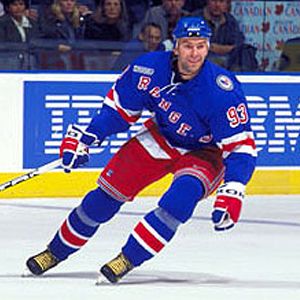 Nedvěd found a level of stability with the Rangers
Nedvěd found a level of stability with the Rangers
The Rangers then traded Nedvěd to the Edmonton Oilers at the trade deadline in 2004. His stay in Edmonton was brief, just 16 games.
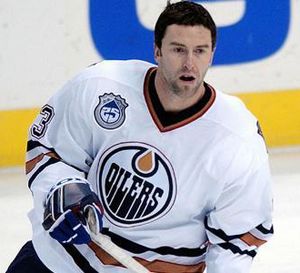 Nedvěd's first stay in Edmonton was quite brief,
but so was his second
Nedvěd's first stay in Edmonton was quite brief,
but so was his second
He spent the lockout season of 2004-05 with Sparta Praha in the Czech Republic before signing as a free agent with the Phoenix Coyotes for the 2005-06 season. Or so he thought. 25 games into his Coyotes career, Nedvěd was dealt to the Philadelphia Flyers for the second half of the season.
After starting 2006-07 with 21 games for the Flyers and 14 more for the Philadelphia Phantoms in the AHL, he was claimed off of waivers by the Oilers where his NHL career would conclude with 1 goal and 5 points in 19 games, leaving many to believe his playing days were over.
Nedvěd returned to Europe and signed with Sparta for the 2007-08 season, scoring 20 goals in 45 games. He took one final shot at the NHL, but was released by the Rangers during training camp in advance of the 2008-09 season. Still not ready to hang up his skates, Nedvēd signed with HC Bílí Tygri in his hometown of Liberec.
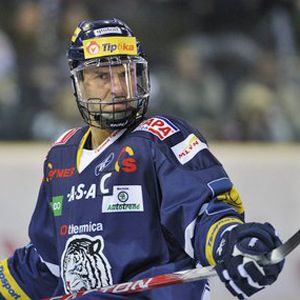 HC Bílí Tygri Liberec was happy to welcome Nedvēd home
HC Bílí Tygri Liberec was happy to welcome Nedvēd home
He would compete for Liberec for six seasons, including leading the team in scoring from 2011 to 2014, highlighted by 61 points in 49 games in 2011-12.
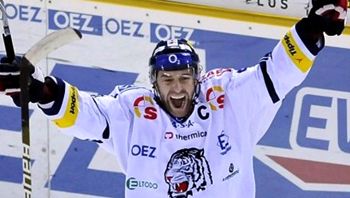 The ageless Nedvēd led Liberec in scoring for the
final four seasons of his career
The ageless Nedvēd led Liberec in scoring for the
final four seasons of his career
During that time period, Nedvěd would make two additional international appearances, his first at the 2012 World Championships, where he became the oldest Czech Republic player to score a goal at the World Championships as the Czechs won the bronze medal, his only medal as a member of the Czech National Team.
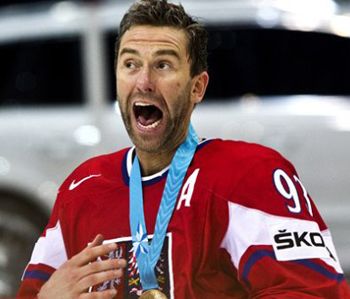 His bronze medal was greeted with child-like joy
and was his first and only for the Czech Republic
His bronze medal was greeted with child-like joy
and was his first and only for the Czech Republic
Two years later he would be named to the squad that would compete at the 2014 Olympics in Sochi, Russia. "My whole life has been a strange journey," Nedved said at Bolshoy Ice Dome. "It was a great honor to play for Canada. I really, really enjoyed it. Now playing for my own country, it's a special meaning to me, especially at my age and the last season of my career. I couldn't ask better for anything than that.
Nedved keeps lacing up the skates for a simple reason.
"I still love the game he said. "I love the competition. I still have the drive. (But) this is my last season. I kind of feel that I could probably play maybe for a couple more years, (but) it's time.
"I never thought at the end of my career, after 20 years, I would go to the Olympic Games. This is kind of a nice way to end my career."
At the conclusion of Liberec's 2014-15 season, Nedvěd would finally retire at the age of 43 on March 13, 2014.
Due to
Nedvěd's holdouts, which contributed to his frequent trades, his
Sillinger Number (the number of different jerseys worn in one's NHL career) is 24, thanks in part to his time with the Rangers, as they wore not only home and road sweaters, but two colors of alternate jerseys as well as a pair of vintage throwbacks and a special one-off jersey during his time in New York.
Today's featured jersey is a
1993-94 Team Canada Petr Nedvěd jersey, as worn in the 1994 Olympics in Lillehammer, Norway, which concluded with the famous shootout in the gold medal final, won by Sweden's
Peter Forsberg's dramatic move.
This Team Canada Nedvěd jersey is emblematic of not only his defection from Czechoslovakia to his adopted country of Canada, but unfortunately also his multiple contract holdouts, as he would normally have been in the midst of an NHL season at the time of the 1994 Olympics.
The Canadian National Team Programme of Excellence, founded by Father David Bauer, began in 1983 with the purpose of forming a club which would play together for an extended schedule in preparation for the Olympics as well as other international tournaments. The program lasted until 1998, when NHL professionals began competing in the Olympics, and met with limited, but increasing success, winning two silver medals in it's final two tries.
Bonus Jersey: Today's bonus jersey is a
1996 Czech Republic National Team Petr Nedved jersey as used in the 1996 World Cup of Hockey where Nedved played his first games for the Czech National Team following his defection from Czechoslovakia as a 17 year old.
In 1995, Nike purchased Canstar, a part of which was the Bauer brand. Beginning in 1996, Nike took over as the supplier of jerseys to the IIHF and hit the ground running with their beautiful "waving flag" jerseys, which most teams wore at the 1996 World Championships. The Czechs, however, did wear a more traditional jersey style, branded as Bauer, with classic straight waist and shoulder striping when they won the 1996 World Championship.
They debuted their new waving flag style at the 1996 World Cup of Hockey later that fall, again branded as Bauer, along with Sweden and Canada. These three teams wore the larger 4" diameter tournament patch, while the other five teams in the tournament, Finland, Slovakia, Russia, Germany and the United States, all wore Nike branded jerseys and used the 3" diameter tournament logo patch.
These beautiful jerseys would have an all to short life span. They would be used again during the 1997 World Championships, but replaced for the first Olympics with NHL participation in February of 1998.
Extra bonus jersey: Today's extra bonus jersey is a
2002-03 New York Rangers Petr Nedvēd jersey from the team the well-traveled Nedved is most closely associated with due to his five year run with the club during his second stint with the club.
Today's video segment begins with Nedved's famous goal in the fourth overtime of the Penguins playoff game against Washington.
Here is a story on Nedvēd and his defection from Czechoslovakia.









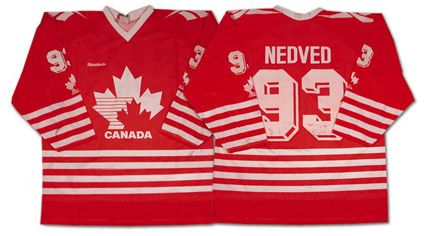
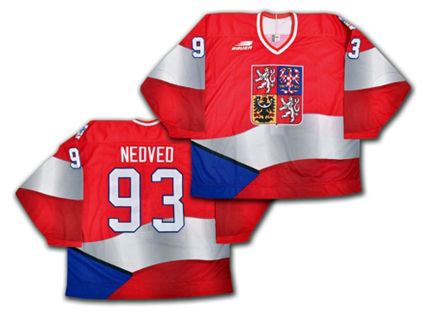
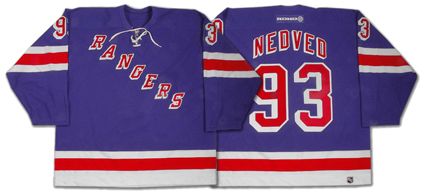










No comments:
Post a Comment
We welcome and encourage genuine comments and corrections from our readers. Please no spam. It will not be approved and never seen.